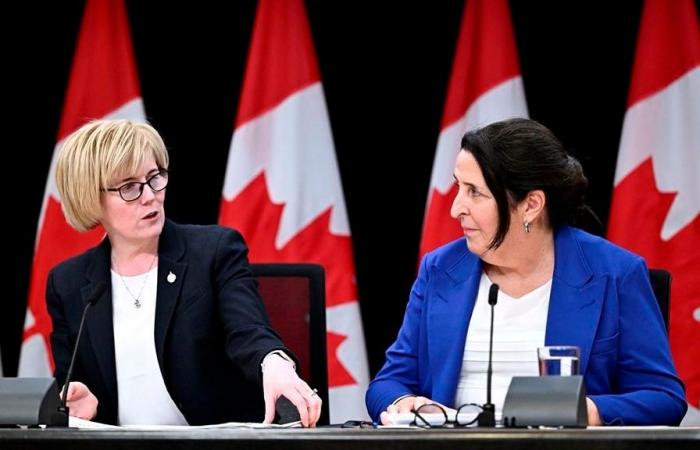A national commission has started public consultations across the country, an online register of those sanctioned or investigated for mistreatment in sport has been launched and a radical change in the handling of future complaints was announced.
Observers believe that Canada is still far from the cultural change necessary to rid sport of its toxic behaviors.
“Progress is definitely slow and bumpy,” said Erin Willson, an Olympic artistic swimmer and former president of AthletesCan, which provides a unified voice for national team athletes.
“The big question I've been asking myself, probably for seven or eight years, is how do we change the culture of sport. It all comes down to the values of sport, what we value and what we praise. I really believe that it all starts from there. It's all well and good to say that we need to treat people better, but when the only thing we celebrate is victory (…) we can never change.”
SEE ALSO | Referees have had enough and are leaving the profession: Hockey Quebec promises to “move things forward”
Bruce Kidd, professor emeritus of sport and public policy at the University of Toronto, gives Canada an average rating in sports safety for 2024.
“We're in the C-plus zone,” assessed Kidd, a former runner who represented Canada in the 1964 Olympics.
“There is a universal code of conduct to prevent and eliminate mistreatment and abuse, the CCUMS (the Universal Code of Conduct to Prevent and Counter Abuse in Sport). There are still many, many, many people who don’t know it.”
The director of Athletes Empowered, Amelia Cline, a lawyer and former elite gymnast, believes that beyond an increased awareness that there is a problem to be solved in sport, she does not saw only minimal progress in 2024.
“There are still a lot of people in the system who either turn a blind eye to what's going on or enable it by retaliating against people who come forward and discouraging them from doing so,” Cline said. If these people are allowed to remain in the system with impunity, there will be no change.
“We still have people in the system who are being abused, and who are terrified to come forward, even with all of these policies and all of these processes and all of the public awareness of these issues, which means that the Change isn't really happening, is it? It's like only on the surface. This does not achieve the objective to be achieved. Unfortunately, we are still in this space.”
After the explosive headlines of 2022 and 2023, when athletes gave heartbreaking testimony to parliamentary committees about sexual, physical and verbal abuse, and Hockey Canada faced scrutiny for its handling sexual assault allegations against members of the 2018 junior men's national team, 2024 has been a year of soul-searching.
In March, the Office of the Sports Integrity Commissioner (BCIS) released a searchable database of people sanctioned or whose eligibility to play sport has been restricted.
As of December, the register listed eight people sanctioned and 18 people subject to provisional restrictions.
“The BCIS registry still only covers the national level,” emphasized Cline, who has spoken before parliamentary committees about the physical and verbal abuse she suffered at the hands of coaches when she was a young athlete.
SEE ALSO | Violence in hockey: yellow armbands to protect minor referees
“There are a lot of incidents at the local level that happen without anyone knowing. As part of our work, [nous avons constaté que] some people didn't know that their own coach at their club had been investigated because the matter was swept under the rug.
“The further development of the register will be very important.”
The Commission on the Future of Sport in Canada, announced in December 2023 by then-Sports Minister Carla Qualtrough, began public consultations in Toronto in October and will conclude them on January 31 in Victoria.
The commission's mandate is to make recommendations in 2025 to make sport safer and improve systems through elements such as culture, policy, funding, governance, reporting and accountability.
“The establishment of the Commission for the Future of Sport has been a good thing, even if it has progressed slowly,” Mr Kidd said.
Willson called the commission “a step forward.”
“It empowers many athletes to share and talk about their experiences in a very thoughtful way,” she said.
However, the political will to implement the commission's recommendations is unclear, following Qualtrough's announcement that she will not seek re-election and the appointment of Terry Duguid as the next sports minister on Friday.
The sports portfolio has seen six leadership changes in just over seven years since Qualtrough's first term as minister, from 2015 to 2017.
“Sport must have a status within cabinet that is commensurate with the enormous challenges ahead,” Kidd said.
Qualtrough also announced that three years after its creation, the BCIS will in 2025 come under the auspices of the Canadian Center for Ethics in Sport, which administers doping controls in Canada in accordance with the World Anti-Doping Agency code.
The minister said in an interview earlier this year that the CCÉS was able to streamline the complaint and sanction process and, as the CCÉS board of directors is not appointed by the government, the transfer can satisfy those who felt that the complaints body should be more independent.
“Over the course of a year and a half, or two, it became clear that there was going to be a better way to provide these functions, these services, things like the athlete reporting line, the investigation, the sanctioning. .. the things that BCIS is doing, that could perhaps address the perceived and real challenges that these functions were facing in this organization,” Qualtrough mentioned.
“The CCÉS has an existing structure for its anti-doping program. It has an established organizational infrastructure … on which it can rely to fulfill these responsibilities.
Willson worries about safety fatigue in sports because “everyone is kind of done with it, or at least that's what it feels like.”
“There are still a lot of issues that need to be resolved,” she said.






